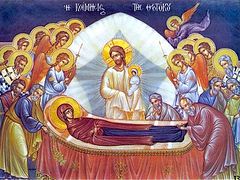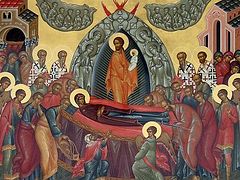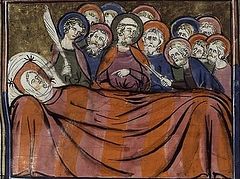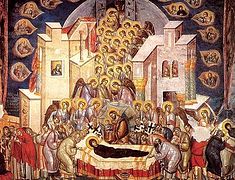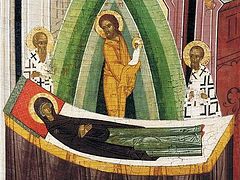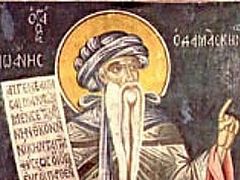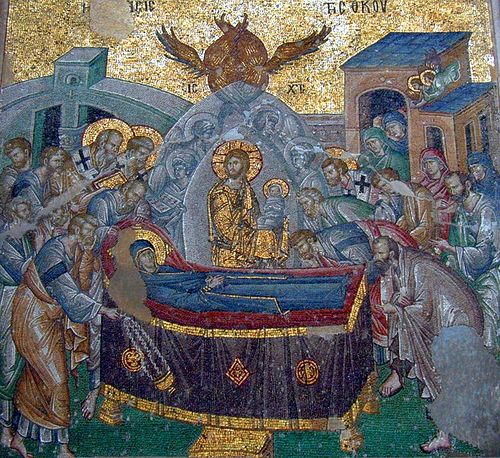 The Dormition of the Mother of God. Mosaic.
The Dormition of the Mother of God. Mosaic.
We have read the last page of the sacred book, the content of which exudes innocence and piety from cover to cover. At the mere sight of this book, even the cruelest critics bearing the weight of prejudice and bias have silently stopped, and having read it from beginning to end, walked away with softened hearts and rejuvenated spirits. Closed now is the book that began with the words, “In the Jewish town of Nazareth lived the childless elder Joachim and his wife Anna…”
How bright are the first pages of this story, truly illuminated by this tender and quiet flush of the evening’s setting sun, so that it might after the night is over shine forth from the east. Who is not gladdened at this aged couple’s happiness, which visited them only at their parting from this world to add a drop of honey to their life so poisoned by sorrow!
The souls of Joachim and Anna where filled with inexpressible paradisal cheer at the sight of their little Daughter, entering the temple of God accompanied by her maiden friends and met there with a modest but solemn greeting. The joy of these elderly, pious souls was all the more pure and perfect in that these parents did not even suspect that this would be the first and last joyful event for their tearfully sought Fruit. The young Mary became an orphan early in life, left without a father or mother. For their piety God spared Joachim and Anna, so that they would not live to see the uninterrupted chain of calamities and suffering that their child would have to go through for the sake of acquiring her reward, truly great and unattainable by any others: their Daughter would be called the Mother of the Son of God.
Joachim and Anna reposed, comforted that they had left their Child under the protection of the temple, under God’s shield. Who then could have foretold the turbulent life of this Maiden who spent her entire youth in the church, in peace, fasting, and prayer? Nevertheless, the storms of the sea of life mercilessly ripped at this orphan, drew her into unknown lands, forcefully plunged her from inspiration into fear, and back again. The shock of the angel’s sudden annunciation concerning God’s great mercy and designating this Virgin to give birth to the Savior of the World would have been more than sufficient for this tender, virginal soul.
But for Mary were prepared much more onerous trials that could have broken even the hardiest of spirits and crushed the greatest courage. After Her first maternal smile to Her Divine Child, Who gladdened Her soul [exhausted] by alarm and the difficult passage through the dark of night and rain, She had to quickly flee [from Palestine to Egypt] without looking back in order to save Her precious and most high Child. It was precisely so, for King Herod feared Her Child Who lay in the straw, and human envy deprived the Son of God of all peace, even in the cave, that humble refuge.
Seized with fear and trembling, She fled across the Palestinian plains, clutching Her little Child close to her breast, indefatigably rushing day and night through forests and deserts, knowing neither roads nor pathways, only to save Him from the sword of the king’s executioners. In fact, she did not quake or weaken in spirit along the way, or faint from anxiety and exhaustion, encouraging herself with the thought that the Lord God is the great King over all gods and that in His hands are the mountains’ heights and valleys of the earth (cf. Ps. 49:1; 45:3–4), for she had from an early age implanted in her soul the teaching of the wise Preacher: Remember now thy Creator in the days of thy youth, while the evil days come not, nor the years draw nigh, when thou shalt say, I have no pleasure in them (Eccl. 12:1).
She endured all this with faith in God, and did not even suspect that the name of the Mother of God would bring her more bitterness than joy. Yes, and could She have thought otherwise after the Archangel Gabriel’s magnificent greeting? And could it even have occurred to anyone that people would greet their Heavenly Emissary and Savior with enmity?
For even as the glory of her Son began to be pronounced all over the world, dolorous presentiments and cares never left her maternal soul. She was continually accompanying Jesus, following Him at a distance amidst the masses of curious people, watching Him with trepidation and drinking in His words, but She never resolved to come closer to him, afraid to trouble Him. She knew about His limitless love for all people, she had heard His words: My mother and my brethren are these which hear the word of God, and do it (Lk. 8:21).
He had ceased to belong only to Her, and had become the living Spring for the whole world, so that anyone who wished could come to Him and drink their fill. But again, He was never so endearing to anyone as to His Mother’s heart. Within that enormous mass of people who followed at Jesus’s heals throughout Palestine and so enthusiastically greeted Him, two eyes always looked intently at Him, two lips ceaselessly repeated his sacred words and quietly uttered prayers for Him. This was His Mother.
Jesus steadily walked ahead, not looking back at the impenetrable wrath of sinners fuming at Him. Nothing disturbed or frightened Him. He was always equally magnificent and decisive—as on the Mount of Olives when entering Jerusalem and other triumphant moments, as well as at the last supper when parting with His disciples before His ascent to Golgotha. And only one attentive heart heard the gnashing of teeth against Jesus, and one soul foresaw the intentions of the godless ones, who sought to ensnare the soul of the righteous man and condemn innocent blood (cf. Ps. 93:21), and every day Her heart was filled with trepidation at what She heard and felt. This was His Mother.
She would have liked to have at least one night alone with Jesus to tell Him about everything that had reached Her ears, what people were saying about Him and what they were preparing for Him; she wanted so badly to inform Him, so that he might be more attentive and cautious, although she knew that He knew everything much better than She. But not even at night did He have a spare moment of rest, instructing His disciples and preparing them for future labors. And She burned with the desire to be at least at night far from worldly vanity to speak with Him a little, and press His weary head to herself. However, her desire was not to be fulfilled, and so She spent Her nights also without Her Son, gazing at the starry sky with tear-filled eyes and directing there the consoling words of King David: According to the multitude of my sorrows in my heart, Thy consolations brought gladness unto my soul (Ps. 93:19).
But all these anxieties of the soul, all the cares and sorrows, all the evil anger and hatred of people that Mary had to endure for Her Son—all this was nothing compared to the terrible blow that was being prepared against Jesus and against Her own soul. For She saw with Her own eyes Her Son bound, spat upon, and bloodied beneath the crown of thorns, and heard those hellish shouts: “Crucify Him, Crucify!” She followed Him to Golgotha, she saw how He lost strength and fell under the cross; She bent to the ground and gathered His blood with the dust. She heard also the sounds of the nails being beaten into His hands that once embraced Her, She saw Him on the cross, naked and formless, having endured horrible torments, covered with sweat and losing His last strength.
O, if only She could but fall at His blood-drenched feet, embrace and kiss them! But even this was impossible for poor Mary. O mothers who lament over your sick sons, remember Mary, suffering beneath the cross on which Her Son suffered in [dreadful] torments! Remember and fortify your hearts with what also encouraged Her: hope in divine mercy!
Christ gave up His spirit. But in the greatest sufferings, before He gave His spirit to His Father, He remembered a certain person and looked down to the earth. Searching out His Mother with His eyes, He saw Her broken and failing in strength. Clearly conscious of yet another of His duties with regard to Her, he cast His gaze upon His most beloved disciple John, and said to His Mother, “Woman! This is Your son!”
Christ’s disciples scattered across the whole world to teach and save the human race. They left their native homes and families and dedicated all their strength to preaching the Savior’s teachings. They were no longer so fearful as on that night when Jesus was seized, but became fearless and mighty giants, disdaining all danger.
As long as they were in Palestine, holy Mary spent time with them, helping them confirm themselves in the Savior’s commandments, encouraging them to all goodness and cheering them. But when the disciples departed from Palestine to distant lands alien and unknown, She remained in John’s house.
She did not waste Her time with trifles, but used every minute for the benefit of mankind, the very human race that crucified Her innocent Son! She dedicated her labors and care to visiting the sick and the imprisoned; she comforted, taught, and instructed anyone who needed support or counsel. She lived strictly according to Her Son’s commandments and therefore she could assuage people’s sorrows. She was a source of healing, and shade, and all who drew from that source felt freshness and relief and were fortified by heavenly love. The good works to which she entrusted Herself filled her soul with great blessedness and consolation, which were the reward for the woes and calamities she previously bore. For only after Her Son was resurrected did her eyes open to what had happened, and hope arrived.
So, now the time had come for Mary to shut her eyes and commend Her soul to God. This took place in peace and quietude. Her death did not evoke any confusion or trouble. Palestine, the former witness of such turbulent events, frantic from the suddenness and unexpectedness of what had gone on, had now calmed down and tranquilly went on about its daily life, only now and then peering at its own face shrouded in glory and gloom in the mirror of its recent past. The world hastens along its everyday, habitual activity.
The Theotokos rests on her bed. But the world feels no change at all, it does not sense that the most God-pleasing Woman has departed from its midst. The world is always the same—with its empty chatter and trivial cares for bodily needs it steals sanctity from the most solemn moments in the history of mankind. As the greatest strugglers for its happiness died in torments, it placidly and with incessant hubbub from a multitude of voices rushed after bread. But now, as the great Benefactress of people lies on her deathbed, the street noise and cacophony of voices is not silent even for a minute.
But as she is carried to her place of rest, as the Apostles sing the funeral hymns, bright memories are resurrected in the soul of this world of the Great Teacher of love and His meek and magnificent Mother. And some are found, undoubtedly found, who will join themselves to the apostles and bedew with warm tears the grave of the exemplary Nazarene Woman, and will correct their lives and deeds according to the Gospel of Her Son. Suddenly, in the twinkling of an eye, the world will forget about its cares and renew its memory of the whole life of this Woman Who had strong faith; and the world itself will be convinced that The name of the Lord is of great strength; and the righteous running to it are exalted (Prov. 18:11).
In the house of the apostle John, peace and quiet reign. Nothing disturbs this reverent atmosphere. There is a small, modest room illumined by two rows of lamps standing around the deathbed. We might think that there was no one in the room, although in fact in this moment almost the entire army of Christ is gathered there. Here are His apostles, who had just arrived from the ends of the earth to see the Mother of their Teacher off to Her eternal abode.
With bowed heads they stand around the Theotokos, and she reposes. Her countenance shines with the mark of goodness and a certain mysterious happiness that witnesses to the absence of all sorrow, and Her final “Farewell!” is filled with mercy and condescension to the whole world, which showed so little sympathy, hospitality, or love to Her and Her Son.

